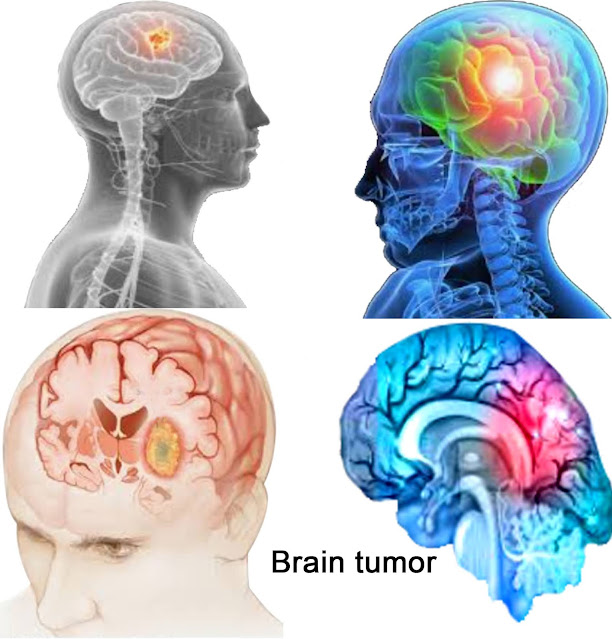 |
| Brain tumor |
Brain tumor:
A tumor is an abnormal growth of cells in any
part of the body or organ and when this tumor is inside the brain we call it a
brain tumor. Brain tumors are either malignant or benign. As the malignant
brain tumor grows, it increases the pressure inside the brain. It is deadly
harmful to us.
Types of brain tumors:
Brain tumors can be divided into two main
types:
- Primary brain tumors and
- Secondary or metastatic brain tumors
Primary brain tumors: Primary brain tumors include tumors arising from brain tissue or tissues surrounding the brain.
Secondary or metastatic brain tumors: Secondary
or metastatic brain tumors include tumors that grow elsewhere in the body, such
as the breast, lungs, kidneys, etc., and migrate to the brain. Metastatic
tumors are considered cancer and are malignant.
Causes of brain tumors:
Brain tumors can occur for a variety of
reasons. However, scientists have not yet been able to find out all the
reasons. Several reasons are known. These factors include:
Family reasons: If there is one in the family,
there is a possibility of another.
Radiation: The effects of various radiations
can cause brain tumors.
Chemicals: These tumors can be caused by
various chemicals.
Age: The risk of brain tumors increases with
age.
Race: Caucasians are more prone to this tumor.
Brain tumors occur when there is a defect in
the DNA of normal brain cells. The body's cells constantly divide and die.
Which is replaced by another cell. In many cases, new cells are formed but it
is seen that the old cells are not completely destroyed. As a result, these
cells coagulate and become tumors.
Symptoms of a brain tumor:
If there is a tumor in the brain, various symptoms
can be seen. These symptoms include:
- Headache
- Nausea or vomiting
- Having trouble seeing
- Headaches are more common in the morning. Sneezing and coughing increase pain.
- Convulsions
- Changes in mood
- Changes in memory.
- Hearing problems.
- Problems speaking.
- The sensation of hands and feet gradually decreases.
- Confusion in daily activities.
- Behavior change.
- Lose balance.
- Numbness of the mouth
- Sleep problems.
Brain tumor diagnosis:
The following tests are performed to diagnose
brain tumors:
EEG: Electroencephalography or EEG is done to
check the functioning of the nervous system.
CT scan and MRI: Nerve conduction test or nerve conduction test or Electromyography radiology or imaging such as CT scan of the brain and MRI are very necessary and important tests for diagnosing any type of brain disease.
FNAC: City-guided FNAC is a very safe, reliable
test for diagnosing any tumor or cancer. The advantage of this is that the
patient does not have to be anesthetized and can be tested more than once.
Stereoscopic biopsy: Stereoscopic biopsy
involves cutting out a portion of the brain tumor or cancerous cell collar for
accurate diagnosis, examining it under a microscope with a special stain.
CSF or Cerebrospinal Fluid Test: The CSF or
Cerebrospinal Fluid Test is a much-needed test for lumbar puncture.
Treatment of brain tumors:
The treatment of brain tumors depends on a
number of factors, such as the location of the tumor, the size, the overall
condition of the patient, and the treatment he chooses. Here are some treatment
options for patients with brain tumors:
Surgery:
If it is found that the brain tumor is located
in a place where surgery is easy, the doctor will rule out the tumor as much as
possible. Sometimes the tumor is small and it is easy to remove it from other
tissues in the brain; So it is easy to remove it by surgery. The comma of a
brain tumor depends on how much of the tumor can be removed. There is a risk of
bleeding or infection after surgery or if there is a tumor connection with the
ear, other risks such as hearing loss in the ear.
Radiation therapy:
Radiation therapy uses high-powered light rays
such as X-rays or proton therapy to destroy tumor cells. An instrument is
either placed outside the patient's body to emit light from outside or is placed
next to the brain tumor inside the patient's body. Proton therapy, a newer
version of radiation, can reduce the side effects of radiation when the tumors
are near a sensitive area of the brain. Cancer is treated with radiation
throughout the brain, which has spread to other parts of the body. It is also
used when multiple brain tumors form as a result of cancer. The side effects of
radiation depend on the type and dose of radiation given to the patient.
Radiosurgery:
Radiosurgery involves the use of multiple radiation rays to destroy tumor cells in small areas. One of the technologies used in radiosurgery to treat brain tumors is the gamma knife or linear accelerator. In this surgery, the treatment is completed in one day and most of the patients go home on the same day.
Chemotherapy:
Chemotherapy is one of the treatments for
cancer where oral pills or injections are given to destroy tumor cells.
Treatment chemotherapy is recommended to understand the type and condition of
the brain tumor. The most commonly used chemotherapy to cure brain tumors is
temozolomide, which is given as a pill. Treatment of brain tumors
Corticosteroids are used to reduce swelling caused by a tumor or other
treatment. Medications and side effects depend on the dosage of what drugs are
used in chemotherapy.
Targeted drug therapy:
This treatment is done by looking at specific
abnormalities in the cancer cells. The drugs used in this therapy destroy the
cancer cells.




0 Comments